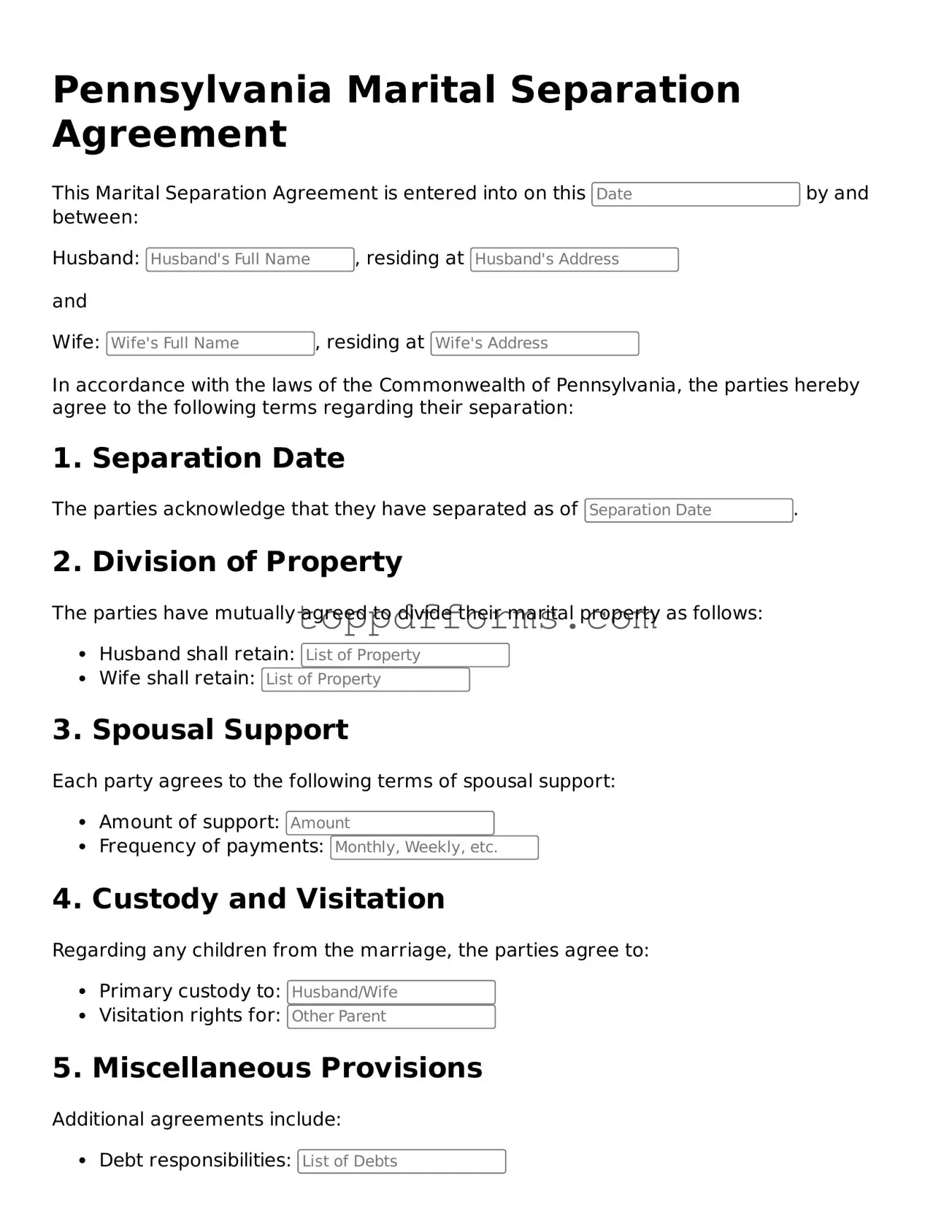Marital Separation Agreement Document for Pennsylvania State
Things You Should Know About This Form
What is a Pennsylvania Marital Separation Agreement?
A Pennsylvania Marital Separation Agreement is a legal document that outlines the terms of a couple's separation. It addresses various aspects of the relationship, including property division, debt responsibilities, child custody, and support. This agreement helps both parties clarify their rights and obligations during the separation period.
Is a Marital Separation Agreement legally binding?
Yes, once both parties sign the Marital Separation Agreement, it becomes a legally binding contract. This means that both individuals are obligated to adhere to the terms outlined in the agreement. If one party fails to comply, the other can seek legal remedies to enforce the agreement.
Do I need a lawyer to create a Marital Separation Agreement?
What should be included in a Marital Separation Agreement?
The agreement should cover several key areas, including the division of marital assets and debts, arrangements for child custody and visitation, child support, spousal support, and any other relevant issues. It’s important for both parties to discuss and agree on these terms to avoid misunderstandings later.
How is child custody determined in a Marital Separation Agreement?
Child custody arrangements in a Marital Separation Agreement are typically based on the best interests of the child. Parents can agree on physical custody, legal custody, and visitation schedules. Courts may also consider factors such as the child’s age, needs, and the parents’ ability to provide a stable environment.
Can a Marital Separation Agreement be modified?
Yes, a Marital Separation Agreement can be modified if both parties agree to the changes. It is advisable to document any modifications in writing and have both parties sign the updated agreement. Significant life changes, such as a job loss or a change in custody needs, may warrant a revision.
What happens if one party violates the Marital Separation Agreement?
If one party does not follow the terms of the Marital Separation Agreement, the other party can take legal action. This may involve filing a motion in court to enforce the agreement. Courts can issue orders to compel compliance or address violations, which may include financial penalties or changes in custody arrangements.
PDF Overview
| Fact Name | Details |
|---|---|
| Definition | A Pennsylvania Marital Separation Agreement is a legally binding document that outlines the terms of separation between spouses. |
| Governing Law | The agreement is governed by the Pennsylvania Divorce Code, specifically Title 23 of the Pennsylvania Consolidated Statutes. |
| Purpose | It serves to clarify issues such as property division, spousal support, and child custody arrangements during the separation period. |
| Enforceability | Once signed by both parties, the agreement is enforceable in court, provided it meets legal requirements and is not unconscionable. |
| Modification | The agreement can be modified by mutual consent of both parties, and any changes should be documented in writing. |
Common mistakes
Filling out the Pennsylvania Marital Separation Agreement form can be a daunting task. Many people make mistakes that can lead to confusion or even delays in the process. One common mistake is not providing complete information. It’s important to fill in all required fields accurately. Leaving out details can create complications later on.
Another frequent error is using vague language. When describing terms such as custody arrangements or division of property, clarity is essential. If the language is unclear, it may lead to misunderstandings between parties. Being specific helps ensure that everyone is on the same page.
Many individuals also forget to include all assets and debts. It’s crucial to list everything owned by both parties, as well as any debts incurred during the marriage. Omitting this information can result in disputes down the line, so thoroughness is key.
Some people overlook the importance of signatures. Both parties must sign the agreement for it to be valid. Failing to do so can invalidate the entire document. Always double-check that all necessary signatures are present before submitting.
Another mistake is not considering future changes. Life circumstances can change, and it’s wise to think ahead. Including terms that allow for modifications can save time and effort later on. It’s better to plan for potential changes now than to face complications in the future.
Additionally, individuals sometimes ignore the legal implications of the agreement. Understanding what the terms mean is vital. Consulting with a legal professional can provide valuable insights and help avoid pitfalls that could arise from misunderstandings.
Lastly, people may rush through the process. Taking the time to review the agreement thoroughly can prevent mistakes. Reading through the document multiple times ensures that everything is correct and complete. A little patience can go a long way in achieving a smooth separation process.
Other Common State-specific Marital Separation Agreement Forms
North Carolina Separation Agreement Template - This document can help ensure smooth transitions for children.
Separation Agreement Florida - Helps outline health insurance responsibilities post-separation.
If you're looking to simplify the transfer of property ownership among friends or family, a Texas Quitclaim Deed is an essential tool, allowing you to do so without the complexities of title warranties. To assist you in this process, you can find useful resources such as PDF Templates that guide you through filling out the necessary forms efficiently.
Legal Separation in Texas Forms for Free - A clear agreement can simplify the division of property and debts.
Legal Separation Ny - The agreement may provide for mutual respect and good communication standards during separation.
